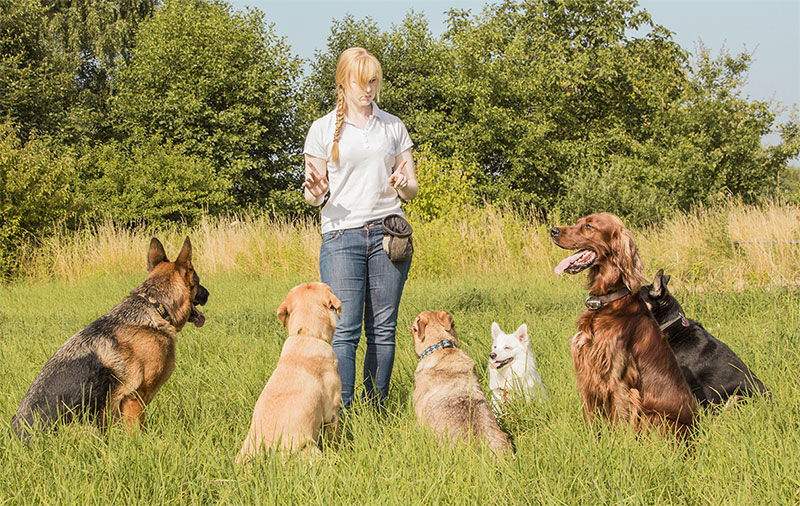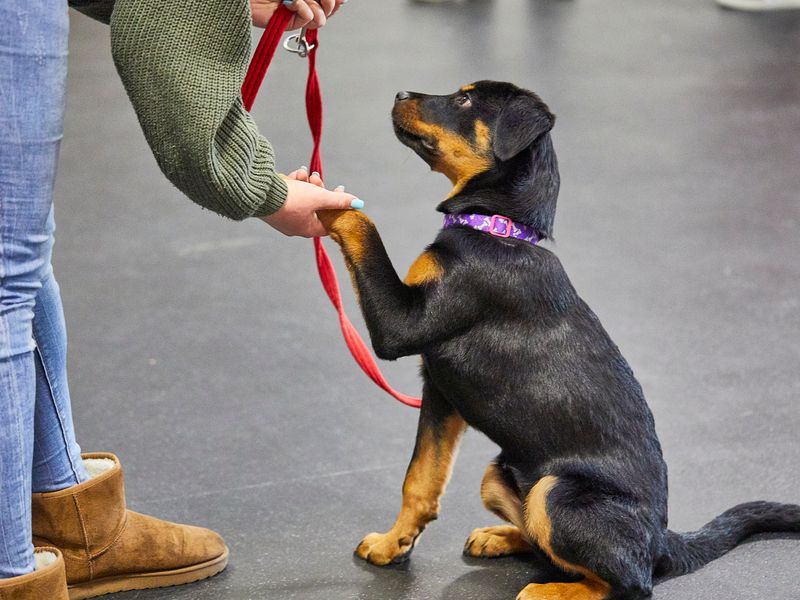The Ultimate Guide to Dog Training for New Pet Parents
The Ultimate Guide to Dog Training for New Pet Parents
Blog Article
The Ultimate Overview to Pet Training: Change Your Family pet's Habits
Effective pet dog training is vital for cultivating a harmonious partnership between family pets and their owners. This guide not just intends to furnish you with the needed tools to change your dog's habits yet likewise welcomes you to explore exactly how these fundamental concepts can lead to a deeper connection with your pet dog.
Comprehending Pet Behavior
Comprehending pet actions is important for efficient training and an unified partnership in between pets and their proprietors. A dog's habits is affected by a mix of genes, environment, and experiences. Dog training. Recognizing these elements enables proprietors to tailor their training approaches to meet the private demands of their pet dogs
Dogs communicate mainly with body movement, articulations, and faces. For instance, a wagging tail can indicate excitement or happiness, while a tucked tail may indicate anxiety or entry. Observing these hints allows owners to react suitably, enhancing positive behaviors and dealing with unfavorable ones effectively.
Furthermore, comprehending the social framework of dogs can provide insights right into their habits. Dogs are pack pets, and they grow in a structured setting. Establishing constant rules and clear limits can protect against confusion and advertise a sense of protection.
Furthermore, identifying the natural impulses of pets, such as the urge to chase after or dig, is vital. These instincts can be redirected via appropriate outlets, such as play or workout. By adequately understanding these behavioral facets, proprietors can foster a positive training experience, inevitably causing a obedient and well-adjusted canine friend.
Essential Training Strategies
Efficient pet training relies upon a variety of vital strategies that can considerably improve the discovering procedure for both the dog and the owner. One essential method is favorable support, which entails rewarding desirable behaviors with treats, praise, or play. This approach encourages dogs to repeat the habits that cause favorable end results, cultivating a trusting connection between the family pet and owner.
One more key technique is consistency in commands and expectations. Utilizing the same verbal cues and hand signals aids the pet dog recognize what is needed, lowering complication and promoting quicker learning. In addition, developing clear limits and guidelines is important for efficient communication.
Socializing is likewise a necessary element of training. Exposing dogs to various atmospheres, people, and various other pets helps them develop ideal social abilities and decreases anxiety in strange circumstances.
Lastly, perseverance and timing are crucial. Training sessions need to be regular but quick, making certain that the pet dog stays involved and receptive. By employing these important strategies, owners can develop a organized and positive training experience that advertises great behavior and strengthens the bond with their canine companions.
Creating an Educating Set Up
Exactly how can a well-structured training timetable improve a dog's discovering experience? A training routine provides uniformity, making sure that canines get regular, focused guideline. This predictability assists dogs understand what is anticipated of them, reinforcing their learning and permitting far better retention of habits and commands.
When developing a training routine, it is essential to think about the canine's age, breed, and private character. Youthful puppies might benefit from shorter, much more regular sessions, while adult canines may prosper with longer, much less constant training periods. Including a selection of activities can also keep the sessions involving, protecting against boredom and promoting interest for understanding.
In addition, organizing training sessions at specific times of the day can help solidify a routine. For circumstances, combining training with day-to-day strolls or play can develop a favorable organization with discovering. It is likewise vital to consist of time for support, such as deals with or praise, to award preferred habits quickly.
Finally, versatility is essential. While consistency is vital, being versatile to the pet's state of mind or power level can improve their knowing experience. A well-crafted training routine eventually lays the foundation for efficient communication and a more powerful bond in between the pet dog and owner.
Common Training Challenges
Regardless of having a well-structured training timetable, pet owners often come across different obstacles during the training process. One common concern is incongruity in commands and signs. When numerous household participants utilize different terms or tones, a pet might become confused, preventing its capability to learn efficiently.
An additional frequent difficulty is interruption. Dog training. Dogs are normally interested animals, and external stimulations such as other pets, noises, or people can divert their focus during training sessions. This calls for owners to develop a controlled setting or gradually present interruptions to reinforce emphasis
Additionally, varying power levels can influence training results. High-energy pets may battle to work out down and focus, while more easygoing types may require additional inspiration to involve. Tailoring the training technique to fit the specific canine's personality is important for success.

Building a Solid Bond
A solid bond between a pet dog and its proprietor is important for effective training and overall wellness. Dog training. This partnership cultivates trust, which is vital for effective communication during the training procedure. When a pet really feels linked and safe and secure to its proprietor, it is most likely to respond positively to commands and cues
To construct this bond, uniformity is vital. Establishing a regimen that includes normal feeding, exercise, and training sessions assists develop a sense of stability. Furthermore, positive support strategies, such as deals with, praise, and play, reinforce desired actions while reinforcing the psychological connection.
Socialization is another essential facet of bond-building. Subjecting your pet dog to different environments, individuals, and Full Article various other animals helps them really feel a lot more comfortable and positive, enhancing the bond with their proprietor. Engaging in activities with each other, such as walking, playing fetch, or joining obedience training, advertises team effort and mutual satisfaction.
Final Thought

Comprehending canine actions is crucial for reliable training and a harmonious you could check here relationship between pet dogs and their proprietors.Effective pet dog training counts on a variety of necessary techniques that can significantly improve the discovering procedure for both the dog and the proprietor.Despite having a well-structured training timetable, canine proprietors often come across numerous obstacles throughout the training procedure.In conclusion, effective canine training depends on a detailed understanding of canine actions, the application of crucial strategies, and the facility of an organized training timetable. By stressing favorable support and uniformity, pet proprietors can dramatically boost their pet dogs' actions, inevitably ensuring a harmonious relationship and advertising the health of both the pet and its setting.
Report this page